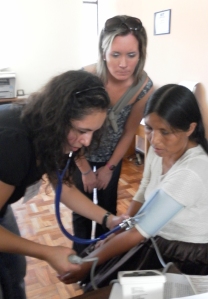Out of the blizzard, into the whirlwind
Day one. We got out of Chicago without a moment to spare. By touch-down in Miami, 600 flights had been cancelled behind us due to the blizzard that blew in just as we had all headed to the airport. Eighteen hours and three flights later, we landed in Cochabamba, along with our more than three-quarters of a ton of medical supplies. A quick shower, quicker lunch, and the team was sorting, selecting and swapping instrument trays, medicine vials, a portable ultrasound machine, even the gloves they will each need for the next six days. The simplest of items found in any U.S. hospital may be out of stock or nonexistent here, resulting in missed opportunities to perform even routine procedures. Each of this mission trip's teams is not only giving this week of their time but has spent months carefully anticipating needs. I was able to do little more than get out of the way as the surgeons/anesthesiologists/physician's assistants/surgical technicians and others made quick order out of the chaos of 32 50-pound suitcases.
As we finished up, Carlos Laserna, the director of our local partner organization here in Cochabamba, invited us to walk over and see the office and warehouse. By the time I got there, Dr. Gay Garrett and her team were already seeing patients. I found Anacani Ramirez and Kristin Villa with patient Nancy Mora, a 42-year-old mother of six, who was clearly in severe pain. When I asked her how long she had been living with it like this, she said about two weeks, prompting her son to add that the pain started probably more than a year ago, but about two weeks ago it got this bad. Dr. Garrett has scheduled her for an 8:00 am laparoscopic gall bladder surgery on Thursday.
While we sat discussing the week's plans in the La Paz airport this morning between flights, Dr. Garrett had commented to me that it is unusual for surgeons here to explain procedures especially to poorer patients, but that she and others have found a very grateful response by patients to this simple gesture of respect. Only a few hours later, I was witnessing such an exchange and verifying for myself the patient's relief to know that there was an answer to her need, and that her dignity was being upheld.
When I asked our local social worker, Maria Ines Uriona, about the case, she explained that the surgery in the public hospital would run around $900 dollars, and much more in a private institution. Nancy struggles on her own to raise her children since her husband left a little over a year ago. She works 10-hour days passing out tickets for a local bus route for about $93 dollars a month. The fact that she had lived with the pain for so long is further testament to her impossibility to pay for surgery. She will need to wait until Dr. Garrett returns from the town of Aiquile where she will be operating the first two days of the week, but there is at least an end near for her pain. The fact that Dr. Garrett offers the surgery using laparoscopic techniques is also a surprise and relief for Nancy, given her need to recover and return to work as soon as possible.
The day ended with a welcome dinner and a hard rain. One of our three teams leaves tomorrow for a bumpy truck ride to Aiquile, so this is the only day we will all be together. It already seems like we are old friends (many of the veterans are!), and I hate to see them leave, but that's what we came for. I haven't slept since Chicago, so I will sign off. More to follow!
- Jodi

